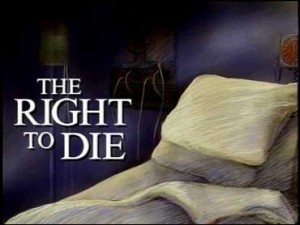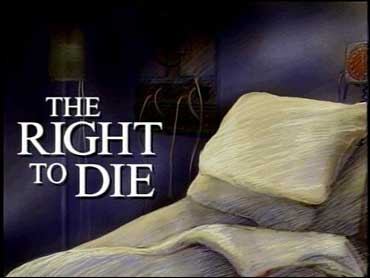Dr. Kevorkian, I Presume?

I can’t say I have ever personally experienced the death of someone important to me, and I’m lucky for that. But I know many of you reading this article have. I can’t even begin to imagine life without my mom, dad, either of my brothers, or any of my friends. I don’t want to and neither do any of you.
But a week after election day, Washington voters had to spend some serious time considering such a situation. Last Tuesday, Washington voters approved Initiative 1000, making it the second state after Oregon to approve medically assisted suicide. The measure passed by a margin of 58 to 42 percent (ironically the same as California’s decision to pass Prop 8).
What could possibly convince people to support assisted suicide? Some supporters, led by the Democratic former governor Booth Gardner, say I-1000 provides a compassionate way for terminally ill people to die. Gardner has Parkinson’s disease, a disorder with no cure that causes the victim to suffer tremors and frozen limbs. Gardner, while not eligible for I-1000, pushed for the measure because he understood why other people might want it as an option. Opponents of the measure, such as the Catholic church, said assisted suicide is a dangerous move that devalues human life. Another concern was that depressed or emotionally vulnerable people who worry they’ve become a burden might exploit the procedure.
I-1000 will implement a lengthy consideration process before a person can actually qualify for assisted suicide. Applicants must be at least eighteen years old, declared competent, and a resident of Washington state. The patient would be required to make two separate oral requests 15 days apart and submit a written request witnessed by two people, one a relative and one a non-relative, -heir, or -attending doctor. Two doctors would then have to certify that the applicant indeed has a terminal condition and six months or less to live. Once all that is done, the patient would then administer the lethal drug to him/herself in the presence of the doctor.
Some students around campus found little issue with the matter of assisted suicide. “Personally, I don’t have a problem with it as long as there is consent,” said Jackie Hartfield, a second year political science major at UC Irvine. “But I’m also pro-choice, so some would argue I believe in murder,” she joked. An anonymous second year film major stated that “Medically-assisted suicide should be legal. I’m glad [the measure passed]. People should have the right to end their suffering.” Other students felt mentally muddled in their positions on assisted suicide. A third year mechanical engineering major, Jason Sarkozi, admitted, “It’s a tough situation… if there is a chance to keep the person alive, then [I’d oppose using assisted suicide].” Some felt more of a personal connection to the measure. “I don’t have a problem with it,” said an anonymous second-year film studies major, “but [my grandma has cancer] and I know she wouldn’t choose to end her life. I don’t think I’d be able to support that kind of action if it were her, even if she wanted it.”
This is one of the rare instances where I’d agree with a religious organization; the matter of assisted suicide definitely knocks down the value of human life a few notches. People are, in some sense of the phrase, putting a price on their own lives. Or deaths. I’m not sure which. But of course, there are cancer patients who endure more pain on a daily basis than most of us can imagine. A person should have a right to decide what to do with themselves if they are of sound mind. Still, I don’t really know how I’d react if my mother was fatally sick and told me she wanted to end her own life. People can commit suicide just fine without a doctor to hand them a lethal syringe, and I don’t think it’s something that needs to be government-operated. Some people could argue we are now literally giving the government control over our lives. There is the matter of families actually persuading or forcing terminally ill family members to sign up for assisted suicide for some monetary gain through a will. And of course there is the possibility of depressed people taking advantage of it, although the qualification process sounds almost airtight.
My final verdict on assisted suicide is a hesitant “No”. People can kill themselves easily- too easily- these days, or ask someone to help them. We see it all the time in the news, and it’s always sad. I don’t feel comfortable legitimizing suicide, even with an airtight qualification procedure, but it’s also not right to deny people in horrendous pain an only way out. But there’s something about turning death into a government-operated business that makes me a little uneasy.
Comments? Leave your intelligent feedback down below or consider following CollegeTimes on Facebook or Twitter to stay updated or to get in touch!
Share This Story:
Please scroll down to leave a comment.

I have to agree with you there, Tom. Choosing to end your own life should be a fundamental right. Your family and friends will almost never want you to do it, but then again, dealing with death was never easy in the first place.
The only reason I disagree with this program is because it extends the reach of government into the realm of death, which to me is one scary concept. I totally and absolutely agree with the humanitarian and personal liberty reasons for allowing assisted suicide; just not if its in the hands of government.
I have no problem at all with assisted suicide, provided there are reasonable controls in place and doctors do the deed.
I’ve been through a situation with someone who would have made that choice and should have been allowed to. The brief amount of life that remained after the choice would have been made was extremely painful, and during that period there was no quality of life at all.
If I ever reach the point where I want to end my life under similar circumstances, I want to be able to do it. To me, it’s an issue of personal freedom and control over one’s own life.
If there’s a less painful option for someone to end their life wife, and they are in those conditions stated above, then I’m fine with it.
How much more consideration it would be for police and medics to have that controlled environment so they don’t have to clean up the mess afterwards or waste precious time.
I don’t think it’s putting a price on life so much as offering a compassionate option for those who wish to end their life.The program would benefit to maybe have counselors on hand to have a session with the petitioner,however.
The only thing that I can agree with you on is a potential liability/coercion issue with this because it is a government function and because there are some people who might exploit the system(family members wanting money,for example).